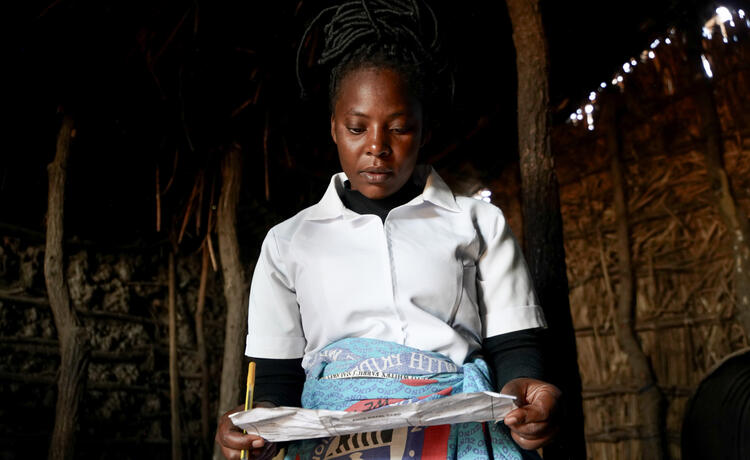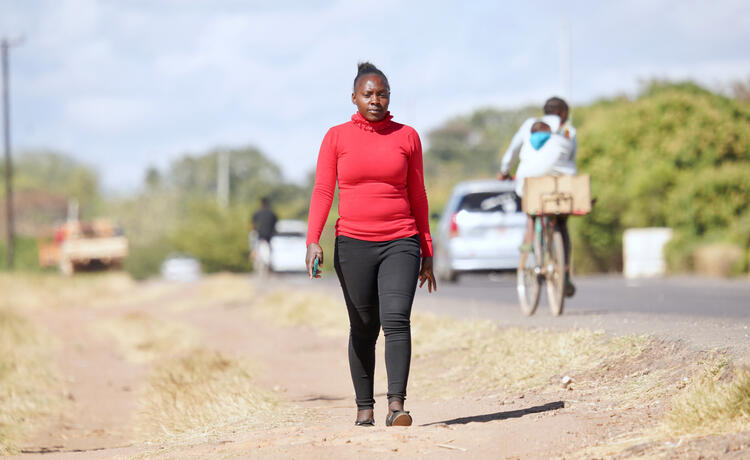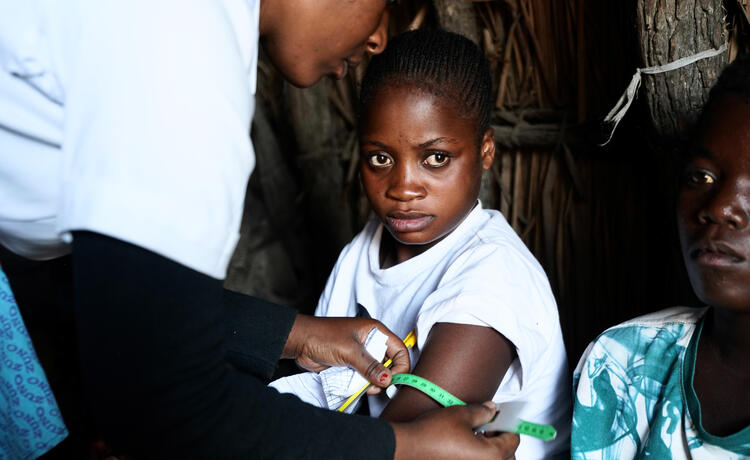News
Drought emergency in Zambia: Child marriage, HIV and hunger on the rise for women and girls
- 03 July 2024
News
SOUTHERN PROVINCE, Zambia – “They don’t have any food, and the teenagers can become vulnerable,” said nurse Suvannah Sinakaaba, in the village of Hakankula in Zambia’s Monze District. “HIV rates are quite high among adolescents; some engage in sexual activities with fishermen, because they want [financial] help.”
Zambia is acutely exposed to the global climate emergency, hit by frequent – and deadly – droughts, floods and heat waves. Now in the grips of its driest agricultural season in more than 40 years, the President has declared a national emergency: Crops have been wiped out, livestock have died, and poverty and food insecurity are deepening for more than 9.8 million people.
Ms. Sinakaaba works with a mobile health team supported by UNFPA, the United Nations sexual and reproductive health agency, which has so far visited districts across the Eastern, Southern and Lusaka Provinces. The teams are reporting worrying trends particularly among teenage girls, such as rising rates of HIV and unintended pregnancy.

Cases of gender-based violence, including sexual exploitation and child marriage, are at risk of rising as many lose their means of making a living for themselves and their families. Having to walk ever longer distances to collect water puts women and girls at added risk of sexual abuse and coercion.
Nurse Loveness Miyoba is also with the mobile team visiting Monze. “Today we are providing antiretroviral therapy for people with HIV,” she told UNFPA. “We also provide antenatal services, children's clinics, family planning and some outpatient services.”
Mentoring against child marriage
UNFPA is working with the Ministry of Health, affected communities and first responders to support sexual and reproductive health and address gender-based violence in areas hit by the drought.
Across six districts in the Eastern and Southern Provinces, UNFPA supports safe spaces that provide counselling and mentoring to reduce the risk of teenage pregnancy and child marriage – especially in times of crisis. Funded by Sweden and launched in 2021, these spaces have been visited by more than 220,000 girls so far.
Veinrander Kaum’Bi is a mentor in Monze town, who told UNFPA, “The challenge is hunger. Because of this drought, some are forced to be married. I see them as my [children], and I can’t let anything bad happen to them – I can’t allow that.”
Zambia already has one of the world’s highest rates of child marriage, with almost one third of girls married between 15 and 19 years old. Although a landmark law was passed in December 2023 to tackle these numbers, as families struggle to put food on the table more girls are reportedly dropping out of school, with fears they will be forcibly wed.

Annah is in her final year at the Manungu School in Monze. “It’s hard to survive with this drought,” she told UNFPA. “As girls, we could [turn to] prostitution to earn money to buy meals. But the mentors taught us to secure our futures, and how to avoid early pregnancy and early marriage [...] they also taught us financial independence, how to set up small businesses and depend on ourselves.”
UNFPA supported the training of more than 80 local volunteers, who mentor families in the Monze District; they also raise awareness about two national helplines offering assistance and referrals for maternal health and gender-based violence protection. Run by Lifeline Childline Zambia, the toll-free lines received over 280,000 calls so far this year – more than 30,000 of which were related to gender-based violence.
Maternal health in crisis
In the affected provinces, acute malnutrition is spiking among pregnant and breastfeeding women and is expected to worsen as the lean season begins in July. Along with diseases spread by drinking and using unsafe water, this can quickly turn life threatening, especially because malnutrition is already at dangerous levels.
“Antenatal bookings have gone down, which is a cause for worry,” said nurse Linda Muleya Libingi.
For thousands in drought-hit areas, the nearest health facility can be hours away, often by foot. In Namalyo village, the Hakunkula health centre some 30 km away is the nearest clinic, said Leonard Zulu, who works with UNFPA in Zambia. “In times of a crisis, and in times of drought like this, the health of women and girls – and especially their sexual and reproductive health – is not prioritized,” he explained.

Precious Siumbwe is 16 and pregnant for the first time. She told UNFPA, “The clinic is very far from here, and even if we walk there, the midwives only come once in a while.”
“Monze District has more than 40 health facilities, and in all of those UNFPA is providing support for mobile clinics, which will be deployed at least once every month for the next three months,” said Mr. Zulu. UNFPA also plans to provide nutritional supplements and cooking lessons demonstrating how to use locally-sourced seeds and nuts as part of a healthy diet.
“But we need more support, we need more resources to be able to ensure these mobile clinics continue over the coming months,” he added. “As you can see, there's really a need for these services.”